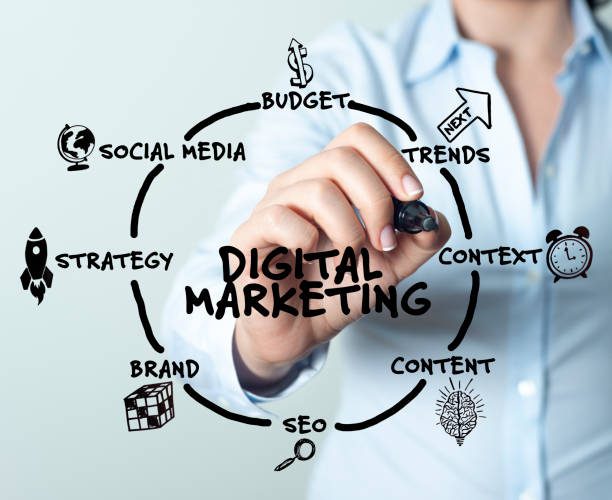Adult internet usage has increased by at least 5% in the last three years, according to Pew Research Center research. And businesses are making use of the opportunities that the digital world provides now more than ever.
In other words, online marketing has a significant impact on people’s purchasing decisions.
The overall goal of marketing, regardless of the sort of digital marketing a company uses, is to engage with the target audience at the right time and in the right place, and what better way to engage with your audience than the internet?
Hence, to begin a digital marketing campaign, marketers must first determine who their target audience is, where they may be reached, and what action they will do next.
If you’re like most business owners, you’ve already experienced the power of a digital marketing strategy. Running a campaign can help you attract new clients, generate more leads, improve your Google search visibility, and ultimately boost revenue.
We’ll break down the how, what, and why of a successful digital marketing strategy in this piece.
Consider this a type of road map. It will assist you in thinking through the important parts of your campaign in order to execute it properly.
What is a Good Digital Marketing Campaign?
A digital marketing campaign entails implementing a marketing plan across all digital platforms where customers interact with a brand, with the goal of increasing conversion rates.
To tag a digital marketing campaign good and successful, it must drive a high return on investment and other important key performance indicators related to company objectives.
This means the ultimate success of a digital marketing campaign should not be determined just by the number of individuals who interacted or the number of “likes” received.
Hence, an effective and valuable marketing campaign is one that is based on corporate goals and carried out with strategy and creativity.
What are the Benefits of Digital Marketing Campaigns?
Traditionally, most corporations use television, radio, periodicals, events, and direct mail to reach their target demographic.
Now, businesses are attempting to attract potential buyers through digital platforms as individuals spend more time online. So, marketers are now obliged to go where the people are and reach their audience – which through digital marketing campaign.
If you want to make the switch and broaden your marketing plan, you’ll want to know what these new digital marketing methods have to offer.
Here are 9 benefits of digital marketing campaigns:
- Increase Customer Loyalty with Frequent Communications
- Engages the Customer at Every Buying Stage
- Target the Right Audience
- Generate a Consistent Lead Pipeline
- Optimize and Obtain Better Conversion Rates
- Accurately Measure All Results
- Gain Brand Credibility
- Gets You More Bang for Your Buck
- Levels the Playing Field
What Factors Make a Successful Digital Marketing Campaign?
Most businesses now adopt digital marketing campaigns for so many reasons.
If you’re new to adopting online techniques, digital marketing can leave you feeling overwhelmed.
Especially when your customers may now access your website anytime via smartphones and tablets, and with new technological devices.
As a result, an increasing number of businesses are prioritizing digital marketing as part of their long-term growth strategies.
To conduct a successful campaign, you must be committed to the learning curve.
There are ten crucial factors to consider if you want to improve your company’s digital marketing:
- Outline Your Goals
- Learn to Serve Your Customers First
- Determine a Strategy
- Stand out from your competition
- Establish Relevance
- Reach Your Audience
- Incorporate Visuals
- Integrate With All Channels
- Monitor, measure, and track digital marketing performance
- Create Consistency
How Long is a Digital Marketing Campaign Last?
Marketing is something that smart business owners never stop doing.
This is especially true in today’s digital environment, when search results are constantly changing due to trends, technology, and algorithms. Your digital marketing strategy should include an ongoing effort to stay current.
However, how long should a digital marketing campaign last?
Digital marketing isn’t a one-time effort, and though it can have a quick impact, it takes time to fully optimize.
Even after you’ve achieved acceptable performance, you’ll need to maintain optimizing to stay ahead of the competition and keep expenses down.
The length of an efficient digital marketing campaign depends on several aspects, including your budget, industry, competition, consumer habits, and campaign style.
There are, however, some basic rules that may be utilized to set up and measure the success of a campaign.
Building momentum around a digital marketing endeavor typically takes at least 90 days, with most campaigns lasting six to 12 months.
While a campaign may last several months, a single message should be updated more frequently. It’s best to switch up your creativity every 45-60 days. According to studies, it takes a customer 45 days to remember and recall information.
Digital Marketing Campaigns: 6 Steps for a Powerful Digital Strategy
If you’re like most business owners, the prospect of developing and executing a digital marketing campaign is daunting.
After all, there are dozens of platforms to choose from and hundreds of methods to implement.
However, by taking the time to plan out your digital campaign step by step, you can improve your odds of success while lowering your overall stress level.
So, how do you go about creating a truly successful digital marketing campaign?
In this post, you’ll discover what a digital marketing campaign is and how to execute and construct one using a 10-step approach.
Step #1: Define Your Digital Marketing Campaign Goals
Defining your goals is the first stage in building a digital marketing strategy. Although this may appear to be self-evident, many businesses fail to take this step.
When it comes to building a digital marketing campaign, the old adage “you can’t manage what you don’t measure” is especially true. If you don’t know what your goals are, you won’t know what your aim is, and you won’t be able to tell if you’ve achieved them.
So, what kind of digital marketing objectives should your campaigns have? Here are a few that are commonly used and significant.
- Brand Awareness
- Consideration
- Conversion
- Loyalty
- Advocacy
It’s critical to define SMART goals when planning your digital marketing campaign objectives.
Be Specific: Your aim must be specific, such as “We aim to improve the number of leads we produce online.” “We aim to produce 150 new leads,” for example, must be quite specific.
Measurable: Your objective must be quantifiable. You’ll never know if you reached your goal if you can’t measure it.
It’s simple to measure a target of generating 150 leads.
Reachable: A goal that isn’t attainable isn’t a realistic objective. Your marketing objectives must be achievable. You won’t hit them if they aren’t, and you’ll feel discouraged.
Relevant: The goals that will genuinely get meaningful results for your company are those that are relevant. Set digital marketing objectives that will have a positive impact on your company.
Step #2: Determine Digital Marketing KPIs
It’s time to decide the Key Performance Indicators after you’ve created your SMART goals. KPIs are the most critical and relevant metrics for your campaign. To establish whether your digital marketing campaign was successful, you’ll compare it to these digital marketing KPIs.
You will inextricably link your KPIs to the overall goals you define for your campaign.
Let’s imagine you’re in charge of a social media campaign plan. To attract traffic to a landing page, you’ll employ Facebook ads. The landing page promotes a free eBook that visitors can obtain by joining your email list.
Step #3: Determine Your Target Audience and Value Propositions
When planning your digital marketing campaign, it’s vital to identify your target audience as well as the value propositions you’ll deliver to them. Your target audience is the demographic that your digital marketing campaign is aimed at.
If you own an ecommerce business that sells baby supplies, for example, you might target men and women between the ages of 25 and 40. This is the demographic that is most likely to have children. If you own an auto glass company, you may advertise to men and women in your area.
When it comes to creating your target audience, smaller is usually preferable to huge. If your target audience is too broad, you’ll waste money advertising to people who aren’t actually interested in your product or service. You’ll end up wasting money in the end. After you’ve defined your target audience, you’ll need to figure out what value proposition you’ll give to them.
The reason your target audience should interact with you is your value proposition. To put it another way, you’re offering your audience a cause to click on your ad, share your blog article, or visit a specific page on your website.
Let’s imagine you’re running a Pay per Click campaign on Google and you’re displaying an ad. Why should anyone click on that advertisement? What are they going to gain out of it?
- Will they be able to receive a deal on your services?
- Will they receive crucial information that will assist them in resolving their issue?
- Will they be able to find what they’re looking for?
The big WHY underlying any digital marketing effort is your value proposition. Don’t think that just because you spend money on advertising, you’ll see results. You must provide a compelling cause for your audience to interact with you.
Step #4: Build a Plan and Budget
It’s time to create a marketing plan and budget after defining your target demographic and value offering. You can and should use a variety of different channels in your campaign. These are some mediums:
Build Your Website
Your website should ideally be optimized to help you reach your overall aim. If you want to boost the number of leads you get, make sure your website is lead-optimized. If you want to raise brand awareness, your website should be packed with clear information that educates visitors about your firm.
If your website isn’t optimized for your purpose, you’ll need to pay for a makeover to bring it up to speed with your end aim.
Search Engine Optimization
SEO should be a high priority depending on your overall goal.
Being on the first page of Google is an excellent strategy to enhance your brand’s overall visibility and organic traffic to your website.
Content Marketing
When planning your content marketing budget, consider both the expense of creating the material and the time it will need to promote it across several platforms.
The marketing method varies, but it typically entails emailing selected individuals to inform them of the information, promoting the content on social media, advertising the content, attempting to obtain links back to it, and so on.
Pay-per-Click
Ads that appear at the top and bottom of Google search results are known as pay-per-click (PPC) ads. These adverts can be a powerful tool for driving targeted traffic to a specific page on your website.
You’ll need to budget for both the time it will take to research and develop the ads and the money you’ll spend on them.
Step #5: Execute Your Plan
After you’ve completed the first four steps, it’s time to put your strategy into action. If you’ve done your homework, this shouldn’t be too difficult. It merely entails carrying out the strategy you’ve previously devised.
For example, if you’re running a content marketing campaign, you’ll need to develop content, distribute it, reach out to people who can link back to it, ask others to share it, and so on.
If you’re launching a social media ad campaign, you’ll need to design ads for Facebook, Twitter, and any other platforms you intend to use.
Step #6: Measure Your Impact
The last phase in every digital marketing campaign is to assess its effectiveness. You compare your actual outcomes to your expected results at this point. It’s safe to assume that if your goal was to produce 150 new leads and you ended up with 200, your campaign was a success (all other factors being equal).
If you wanted to be in the top five Google search results for a specific search term and ended up in the 15th slot, your campaign failed miserably.
At this point, your digital marketing KPIs is critical. Even if you get thousands of clicks on a given ad, if clicks aren’t a KPI, they’re not very relevant to your campaign.
It makes no difference how many clicks you get if you only increase revenue by 20% if your goal is to increase revenue by 40%.
Conclusion
Knowing your overall goals and then the precise measures required to achieve those goals are the most important aspects of creating a digital marketing strategy. It’s vital to keep your overall goals and KPIs in mind while analyzing the performance of your campaign.
Don’t get caught up in flashy stats that signify nothing for your campaign’s ultimate success. Keep your eyes on your objectives and only consider a campaign a success if you achieve them.
However, if you still find it difficult to create a marketing campaign, you don’t need to waste your resources learning it. It would be better you invited professionals to help you handle it.
Socialander is a digital marketing agency that helps you double your profits with deep experience in creating digital marketing campaigns. We’ve done this for so many professionals and we can do the same for you. Just book a free consultation session with us today by clicking “I want a Free Consultation Session”, so we can help you create an amazing campaign.





